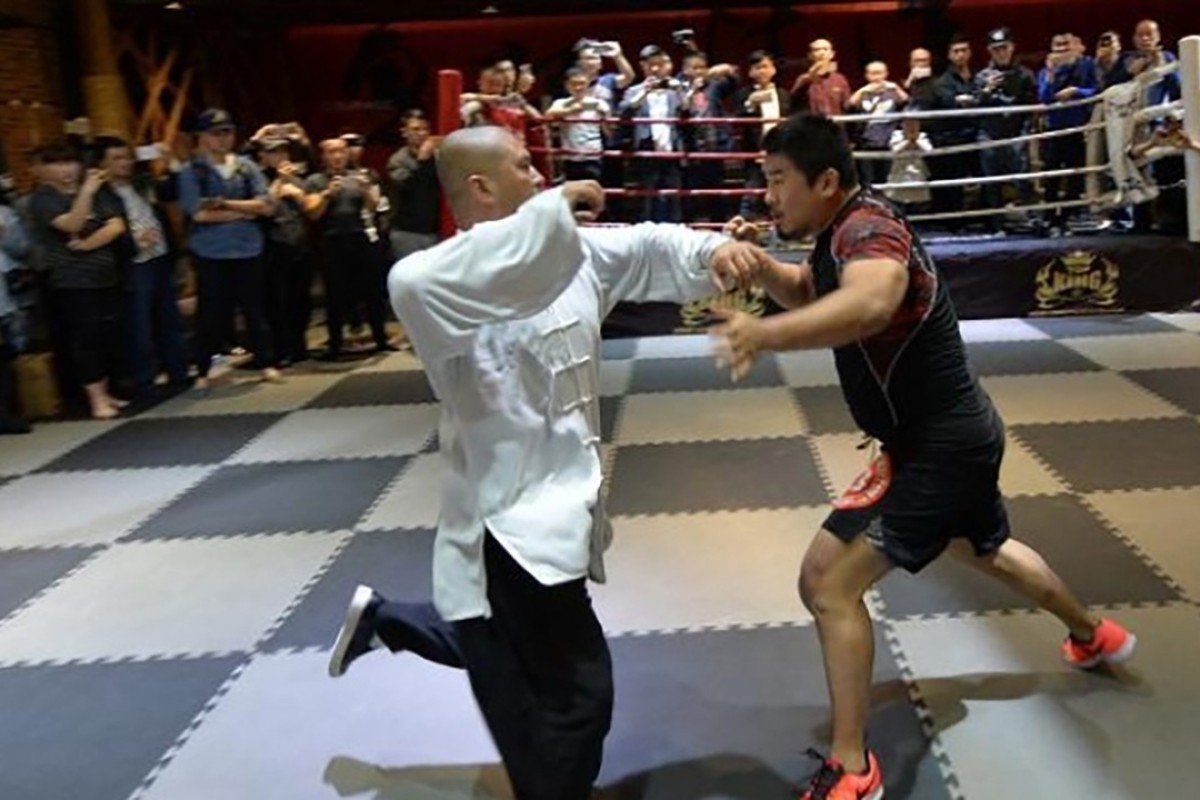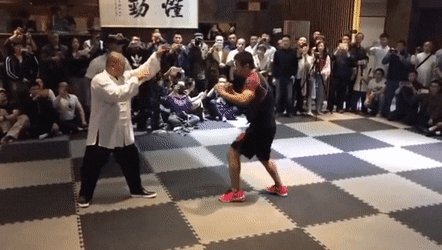By DIDI KIRSTEN TATLOW

Destroying Chinese cultural myths: Wei Lei, the tai chi master, faced off against Xu Xiaodong, the mixed martial arts fighter, in Chengdu.
BEIJING — For weeks, the mixed martial arts fighter Xu Xiaodong had been taunting masters of the traditional Chinese martial arts, dismissing them as overly commercialized frauds, and challenging them to put up or shut up.
After one of them — Wei Lei, a practitioner of the “thunder style” of tai chi — accepted the challenge, Mr. Xu flattened him in about 10 seconds.
Mr. Xu may have proved his point, but he was unprepared for the ensuing outrage.
When video of the drubbing went viral, many Chinese were deeply offended by what they saw as an insult to a cornerstone of traditional Chinese culture.
The state-run Chinese Wushu Association posted a statement on its website saying the fight “violates the morals of martial arts.”
After one of them — Wei Lei, a practitioner of the “thunder style” of tai chi — accepted the challenge, Mr. Xu flattened him in about 10 seconds.
Mr. Xu may have proved his point, but he was unprepared for the ensuing outrage.
When video of the drubbing went viral, many Chinese were deeply offended by what they saw as an insult to a cornerstone of traditional Chinese culture.
The state-run Chinese Wushu Association posted a statement on its website saying the fight “violates the morals of martial arts.”
The Chinese Boxing Association issued similar criticism.
An article by Xinhua, the state news agency, called Mr. Xu a “crazy guy,” saying that the fight had caused people to question whether Chinese martial arts were of any use and even to ask, “What exactly are traditional Chinese martial arts?”
The reaction has been so furious that Mr. Xu has gone into hiding.
“I’ve lost everything, my career and everything,” he said in a message circulating online.
An article by Xinhua, the state news agency, called Mr. Xu a “crazy guy,” saying that the fight had caused people to question whether Chinese martial arts were of any use and even to ask, “What exactly are traditional Chinese martial arts?”
The reaction has been so furious that Mr. Xu has gone into hiding.
“I’ve lost everything, my career and everything,” he said in a message circulating online.
“I think many people misunderstand me. I’m fighting fraudulence, but now I’ve become the target.”
Many people around the world assumed that this debate had long been settled.
Many people around the world assumed that this debate had long been settled.
Mixed martial arts fighters have for years held exhibition fights against practitioners of traditional Chinese martial arts.
The old ways, for all their balletic grace, lost decisively.
Known broadly as wushu, traditional Chinese martial arts include such disparate disciplines as qigong, categorized as an “internal” practice that is mostly spiritual, and kung fu, an “external” art that is practiced by the monks of the Shaolin Temple and was popularized around the world by Bruce Lee.
There are hundreds of styles of wushu in China, and many overlap.
Tai chi, while a martial art, is viewed by many today as a spiritual breathing and balance exercise enjoyed by people of all ages, usually performed in slow motion in a quiet park instead of a fight ring.
Mixed martial arts, or M.M.A., is a “no-holds-barred” fighting style developed over the last century from fighting styles around the world.
Tai chi, while a martial art, is viewed by many today as a spiritual breathing and balance exercise enjoyed by people of all ages, usually performed in slow motion in a quiet park instead of a fight ring.
Mixed martial arts, or M.M.A., is a “no-holds-barred” fighting style developed over the last century from fighting styles around the world.
It began to gain popularity in the United States in the 1980s.
While it is violent, it does have rules — including no biting, spitting or gouging.
The fight between Mr. Xu and Mr. Wei was brutal.
The fight between Mr. Xu and Mr. Wei was brutal.
As Mr. Wei circled slowly, arms outstretched in a calm tai chi defense, Mr. Xu lunged, jabbed him to the floor, then used a “ground and pound” technique to subdue him.
It was all over in about 10 seconds.

Mr. Xu did not respond to a request for an interview sent to his personal Weibo account a few days after the fight on April 27.

Mr. Xu did not respond to a request for an interview sent to his personal Weibo account a few days after the fight on April 27.
Shortly afterward, his account was taken down as the authorities rushed to try to tamp down the controversy.
A woman reached by telephone at the Battle Club in southeast Beijing, where Mr. Xu works, said he was not giving interviews.
A woman reached by telephone at the Battle Club in southeast Beijing, where Mr. Xu works, said he was not giving interviews.
She declined to give her name.
On Wednesday morning, the door of the Battle Club, in the dingy basement of a high-rise, was locked.
On Wednesday morning, the door of the Battle Club, in the dingy basement of a high-rise, was locked.
Photographs of Mr. Xu and other M.M.A. fighters decorated the walls of the stairwell.
An electrician lingering by a cigarette shop at the top of the stairs said he practiced wushu and had come to check out the club after hearing about the controversy.
An electrician lingering by a cigarette shop at the top of the stairs said he practiced wushu and had come to check out the club after hearing about the controversy.
He said that Mr. Xu had been right to pose his challenge, even though it had infuriated people.
“No one can avoid fighting,’’ said the man, who gave only his surname, Lian, and a social media username, Ruyi.
He said defenders of the traditional martial arts were incensed that Mr. Xu had dared to say that they staged impressive performances but were ineffective fighters and that, by doing so, he had threatened their livelihoods.
Yet Mr. Xu’s ultra-aggressive assault on his tai chi rival had missed an important point, Mr. Lian added.
“The key difference between what Mr. Xu does and martial arts is that martial arts isn’t a competitive sport,’’ he said.
“No one can avoid fighting,’’ said the man, who gave only his surname, Lian, and a social media username, Ruyi.
He said defenders of the traditional martial arts were incensed that Mr. Xu had dared to say that they staged impressive performances but were ineffective fighters and that, by doing so, he had threatened their livelihoods.
Yet Mr. Xu’s ultra-aggressive assault on his tai chi rival had missed an important point, Mr. Lian added.
“The key difference between what Mr. Xu does and martial arts is that martial arts isn’t a competitive sport,’’ he said.
“It’s not about really hurting. It’s about giving your opponent ‘face.’ And Mr. Xu’s style is about beating your opponent to near death.”
Aucun commentaire:
Enregistrer un commentaire